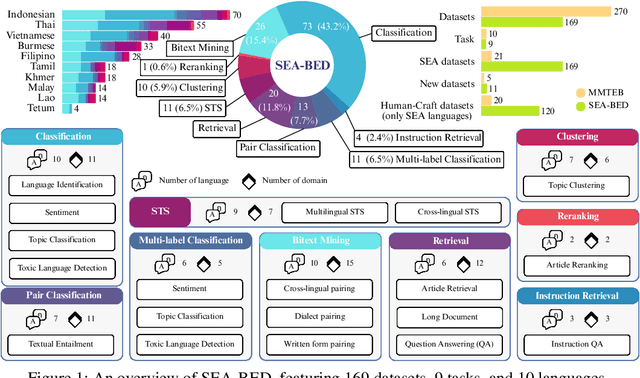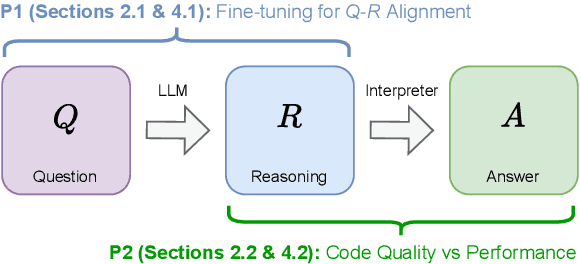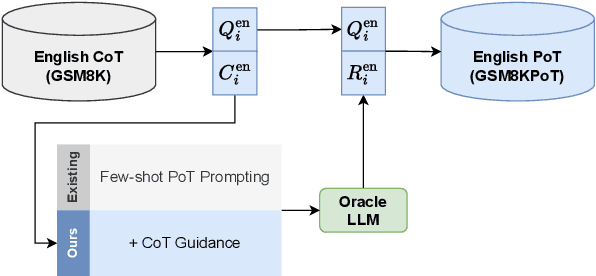Sarana Nutanong
MultiLexNorm++: A Unified Benchmark and a Generative Model for Lexical Normalization for Asian Languages
Jan 23, 2026Abstract:Social media data has been of interest to Natural Language Processing (NLP) practitioners for over a decade, because of its richness in information, but also challenges for automatic processing. Since language use is more informal, spontaneous, and adheres to many different sociolects, the performance of NLP models often deteriorates. One solution to this problem is to transform data to a standard variant before processing it, which is also called lexical normalization. There has been a wide variety of benchmarks and models proposed for this task. The MultiLexNorm benchmark proposed to unify these efforts, but it consists almost solely of languages from the Indo-European language family in the Latin script. Hence, we propose an extension to MultiLexNorm, which covers 5 Asian languages from different language families in 4 different scripts. We show that the previous state-of-the-art model performs worse on the new languages and propose a new architecture based on Large Language Models (LLMs), which shows more robust performance. Finally, we analyze remaining errors, revealing future directions for this task.
Evaluating Perspectival Biases in Cross-Modal Retrieval
Nov 03, 2025Abstract:Multimodal retrieval systems are expected to operate in a semantic space, agnostic to the language or cultural origin of the query. In practice, however, retrieval outcomes systematically reflect perspectival biases: deviations shaped by linguistic prevalence and cultural associations. We study two such biases. First, prevalence bias refers to the tendency to favor entries from prevalent languages over semantically faithful entries in image-to-text retrieval. Second, association bias refers to the tendency to favor images culturally associated with the query over semantically correct ones in text-to-image retrieval. Results show that explicit alignment is a more effective strategy for mitigating prevalence bias. However, association bias remains a distinct and more challenging problem. These findings suggest that achieving truly equitable multimodal systems requires targeted strategies beyond simple data scaling and that bias arising from cultural association may be treated as a more challenging problem than one arising from linguistic prevalence.
Distilling Multilingual Vision-Language Models: When Smaller Models Stay Multilingual
Oct 30, 2025Abstract:Vision-language models (VLMs) exhibit uneven performance across languages, a problem that is often exacerbated when the model size is reduced. While Knowledge distillation (KD) demonstrates promising results in transferring knowledge from larger to smaller VLMs, applying KD in multilingualism is an underexplored area. This paper presents a controlled empirical study of KD behavior across five distillation approaches, isolating their effects on cross-lingual representation consistency and downstream performance stability under model compression. We study five distillation formulations across CLIP and SigLIP2, and evaluate them on in-domain retrieval and out-of-domain visual QA. We find that some configurations preserve or even improve multilingual retrieval robustness despite halving model size, but others fail to maintain cross-task stability, exposing design-sensitive trade-offs that aggregate accuracy alone does not reveal.
WangchanThaiInstruct: An instruction-following Dataset for Culture-Aware, Multitask, and Multi-domain Evaluation in Thai
Aug 21, 2025Abstract:Large language models excel at instruction-following in English, but their performance in low-resource languages like Thai remains underexplored. Existing benchmarks often rely on translations, missing cultural and domain-specific nuances needed for real-world use. We present WangchanThaiInstruct, a human-authored Thai dataset for evaluation and instruction tuning, covering four professional domains and seven task types. Created through a multi-stage quality control process with annotators, domain experts, and AI researchers, WangchanThaiInstruct supports two studies: (1) a zero-shot evaluation showing performance gaps on culturally and professionally specific tasks, and (2) an instruction tuning study with ablations isolating the effect of native supervision. Models fine-tuned on WangchanThaiInstruct outperform those using translated data in both in-domain and out-of-domain benchmarks. These findings underscore the need for culturally and professionally grounded instruction data to improve LLM alignment in low-resource, linguistically diverse settings.
SEA-BED: Southeast Asia Embedding Benchmark
Aug 17, 2025



Abstract:Sentence embeddings are essential for NLP tasks such as semantic search, re-ranking, and textual similarity. Although multilingual benchmarks like MMTEB broaden coverage, Southeast Asia (SEA) datasets are scarce and often machine-translated, missing native linguistic properties. With nearly 700 million speakers, the SEA region lacks a region-specific embedding benchmark. We introduce SEA-BED, the first large-scale SEA embedding benchmark with 169 datasets across 9 tasks and 10 languages, where 71% are formulated by humans, not machine generation or translation. We address three research questions: (1) which SEA languages and tasks are challenging, (2) whether SEA languages show unique performance gaps globally, and (3) how human vs. machine translations affect evaluation. We evaluate 17 embedding models across six studies, analyzing task and language challenges, cross-benchmark comparisons, and translation trade-offs. Results show sharp ranking shifts, inconsistent model performance among SEA languages, and the importance of human-curated datasets for low-resource languages like Burmese.
Prior Prompt Engineering for Reinforcement Fine-Tuning
May 20, 2025Abstract:This paper investigates prior prompt engineering (pPE) in the context of reinforcement fine-tuning (RFT), where language models (LMs) are incentivized to exhibit behaviors that maximize performance through reward signals. While existing RFT research has primarily focused on algorithms, reward shaping, and data curation, the design of the prior prompt--the instructions prepended to queries during training to elicit behaviors such as step-by-step reasoning--remains underexplored. We investigate whether different pPE approaches can guide LMs to internalize distinct behaviors after RFT. Inspired by inference-time prompt engineering (iPE), we translate five representative iPE strategies--reasoning, planning, code-based reasoning, knowledge recall, and null-example utilization--into corresponding pPE approaches. We experiment with Qwen2.5-7B using each of the pPE approaches, then evaluate performance on in-domain and out-of-domain benchmarks (e.g., AIME2024, HumanEval+, and GPQA-Diamond). Our results show that all pPE-trained models surpass their iPE-prompted counterparts, with the null-example pPE approach achieving the largest average performance gain and the highest improvement on AIME2024 and GPQA-Diamond, surpassing the commonly used reasoning approach. Furthermore, by adapting a behavior-classification framework, we demonstrate that different pPE strategies instill distinct behavioral styles in the resulting models. These findings position pPE as a powerful yet understudied axis for RFT.
Assessing Thai Dialect Performance in LLMs with Automatic Benchmarks and Human Evaluation
Apr 08, 2025



Abstract:Large language models show promising results in various NLP tasks. Despite these successes, the robustness and consistency of LLMs in underrepresented languages remain largely unexplored, especially concerning local dialects. Existing benchmarks also focus on main dialects, neglecting LLMs' ability on local dialect texts. In this paper, we introduce a Thai local dialect benchmark covering Northern (Lanna), Northeastern (Isan), and Southern (Dambro) Thai, evaluating LLMs on five NLP tasks: summarization, question answering, translation, conversation, and food-related tasks. Furthermore, we propose a human evaluation guideline and metric for Thai local dialects to assess generation fluency and dialect-specific accuracy. Results show that LLM performance declines significantly in local Thai dialects compared to standard Thai, with only proprietary models like GPT-4o and Gemini2 demonstrating some fluency
Towards Better Understanding of Program-of-Thought Reasoning in Cross-Lingual and Multilingual Environments
Feb 25, 2025



Abstract:Multi-step reasoning is essential for large language models (LLMs), yet multilingual performance remains challenging. While Chain-of-Thought (CoT) prompting improves reasoning, it struggles with non-English languages due to the entanglement of reasoning and execution. Program-of-Thought (PoT) prompting separates reasoning from execution, offering a promising alternative but shifting the challenge to generating programs from non-English questions. We propose a framework to evaluate PoT by separating multilingual reasoning from code execution to examine (i) the impact of fine-tuning on question-reasoning alignment and (ii) how reasoning quality affects answer correctness. Our findings demonstrate that PoT fine-tuning substantially enhances multilingual reasoning, outperforming CoT fine-tuned models. We further demonstrate a strong correlation between reasoning quality (measured through code quality) and answer accuracy, highlighting its potential as a test-time performance improvement heuristic.
Addressing Topic Leakage in Cross-Topic Evaluation for Authorship Verification
Jul 27, 2024Abstract:Authorship verification (AV) aims to identify whether a pair of texts has the same author. We address the challenge of evaluating AV models' robustness against topic shifts. The conventional evaluation assumes minimal topic overlap between training and test data. However, we argue that there can still be topic leakage in test data, causing misleading model performance and unstable rankings. To address this, we propose an evaluation method called Heterogeneity-Informed Topic Sampling (HITS), which creates a smaller dataset with a heterogeneously distributed topic set. Our experimental results demonstrate that HITS-sampled datasets yield a more stable ranking of models across random seeds and evaluation splits. Our contributions include: 1. An analysis of causes and effects of topic leakage. 2. A demonstration of the HITS in reducing the effects of topic leakage, and 3. The Robust Authorship Verification bENchmark (RAVEN) that allows topic shortcut test to uncover AV models' reliance on topic-specific features.
Space Decomposition for Sentence Embedding
Jun 05, 2024



Abstract:Determining sentence pair similarity is crucial for various NLP tasks. A common technique to address this is typically evaluated on a continuous semantic textual similarity scale from 0 to 5. However, based on a linguistic observation in STS annotation guidelines, we found that the score in the range [4,5] indicates an upper-range sample, while the rest are lower-range samples. This necessitates a new approach to treating the upper-range and lower-range classes separately. In this paper, we introduce a novel embedding space decomposition method called MixSP utilizing a Mixture of Specialized Projectors, designed to distinguish and rank upper-range and lower-range samples accurately. The experimental results demonstrate that MixSP decreased the overlap representation between upper-range and lower-range classes significantly while outperforming competitors on STS and zero-shot benchmarks.
 Add to Chrome
Add to Chrome Add to Firefox
Add to Firefox Add to Edge
Add to Edge